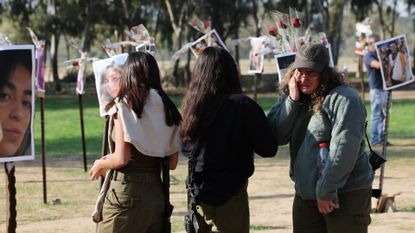HARRIET MARSDEN

The Israeli government has given evidence to the United Nations claiming Hamas militants used rape and sexual violence against women during the 7 October atrocities.
First responders and mortuary workers described multiple signs of sexual assault and torture on female bodies, the BBC reported, including mutilation, inserted objects and broken pelvises. Videos of naked and bloodied women being paraded around Gaza have circulated online.
Police say they have "multiple" eyewitness accounts of sexual assault, reported the broadcaster, but at the time of the BBC report, "they hadn't yet interviewed any surviving victims". Hamas has denied that its fighters sexually assaulted anyone.
"The trendlines for conflict-related sexual violence are worsening," the UN special representative on the issue, Pramila Patten, warned in July – before the outbreak of war in the Middle East. Each new conflict brings new waves of what Patten described as "war's oldest, most silenced and least condemned crime".
Why is rape used in war?
Rape has always existed in war. The breakdown of law and a hypermasculine military culture are often cited as contributing factors. The purpose can range from intimidation and psychological trauma to the spread of disease and forced pregnancies. More recently, rape has been documented as a tool of ethnic cleansing and genocide.
Although the Geneva Conventions (1949) state that women should be protected against rape, it was the wars in the former Yugoslavia from 1992-95 – and evidence that rape was part of the Serbian military strategy of ethnic cleansing – that "revealed the urgent need to bring historic international laws out of theory and into the courtroom", said the International Criminal Tribunal for the former Yugoslavia (ICTY). The ICTY became the first international tribunal to convict for rape as a form of torture.
Up to a quarter of a million women are estimated to have been raped during the 1994 Rwandan genocide. Because the intent was to destroy an ethnic group, it led to the first conviction for rape as a weapon of war and an act of genocide.
But it can "still take decades for perpetrators to be brought to justice" and "in most cases they never are", wrote Christina Lamb, author of "Our Bodies Their Battlefields; What War does to Women", in The Sunday Times . The International Criminal Court "has only convicted two people for sexual crimes in its 22 years of existence", she added.
In many cultures, victims are also ostracised, which can lead to the breakdown of communities and decades of trauma. Of the estimated 100,000 women who have been raped during the two-year civil war in northern Ethiopia, many who gave birth are still "struggling with a hidden agony", said The Washington Post in November. "They have been victimised twice; once during the conflict… and a second time by their own communities."
Why is rape in conflict zones on the rise?
Rising militarisation and arms proliferation are "bringing conflicts across the globe to a boiling point", said the UN's Patten. Humanity is facing the highest number of conflicts since the Second World War; gang rape and sexual slavery are being used as tactics of "torture and terrorism" in these conflicts.
Russian soldiers have been using rape as a "military strategy" in Ukraine, said a UN report last October, targeting victims as young as four. Since civil war broke out in Sudan this year, the Rapid Support Forces have been using rape as a tool to "punish and terrorise" communities, according to another report in August.
Iranian forces committed "horrific acts of rape" against protesters during the "Woman Life Freedom" uprising, said Amnesty International last week. Sexual violence was used "with total impunity as a weapon of torture to crush protesters' spirit, self-esteem and sense of dignity". Prosecutors were "complicit" in ignoring or covering up survivors' complaints, the report said.
The "ever-growing list of conflict zones" where rape has been reported this year "underscores the persistent horror of this scourge", said the US Institute of Peace.
What can be done?
"Wartime sexual violence is neither ubiquitous nor inevitable," said The Guardian in an editorial this week. Military leaders "can and do prohibit and prevent it", but prosecutions "have fallen far short of what is needed".
In 2019, the UN "watered down a resolution on rape in combat, excluding references to sexual and reproductive health due to opposition by the Trump administration". The International Criminal Court (ICC) has convicted only two people for sexual crimes in its 21-year history.
Nevertheless, "any serious attempt to redress these crimes must also ensure that survivors and those working on their behalfs are properly supported", said the paper. And the UK's "failure when it comes to survivors seeking refuge is grim".
No comments:
Post a Comment